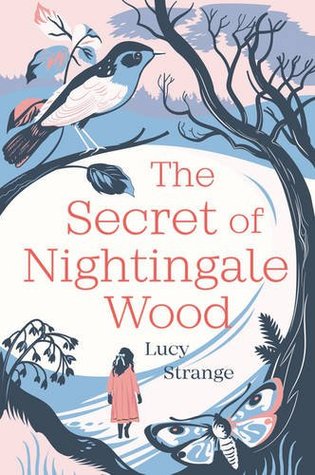This is a children's book suitable for all ages, but probably best appreciated by adults who are still love with their childhood favourites: The Secret Garden, A Little Princess, The Wind in the Willows, Alice in Wonderland and fairy tales of all descriptions. Author Lucy Strange deliberately borrows some of the tropes from the best-loved classics, but fashions them into something original. Set just after World War I, the story explores madness and loss - and the sometimes fine line between fantasy and reality. Mental health is very fashionable in children's and YA literature right now, but Strange (such an apt name) very much suits her themes to her era. The rather brutish and patriarchal attempts to deal with shell-shock and the depression brought on by profound grief are a powerful, dark spectre in this book. Sometimes what is lurking in the woods is ominous . . . and sometimes it is just sad and lonely. The influence of fairy tales is quite strong in this book. And as in all the best childhood classics, it takes a brave, resourceful child to heal the broken world. I did worry, at first, that there was something too perfect and paint-by-number about this book, but I was completely won over by the ending.
The protagonist of the book - Henrietta, called "Henry" - is having to cope with way too much trauma. Her older brother has died in a tragic accident; her mother has retreated into a drug-addled depression; her father is permanently away on business; and a creepy, ominous doctor is trying to make decisions for the family which Henry instinctively feels are wrong. Henry copes by turning to her beloved stories. They are her companions in loneliness, but they also offer safety, comfort and even guidance as she tries to navigate the difficulties of her life. The thing for Henry, though, is figuring out the difference between inspired by stories - and potentially being misled by them. The author has a very deft way of guiding Henry through her own imaginative thicket. This extremely accomplished first novel definitely has a touch of magic in it.
"Mama was quiet for a moment and then she said, 'What a wonderful place the world would be, Hen, if everyone had your imagination.'"
The protagonist of the book - Henrietta, called "Henry" - is having to cope with way too much trauma. Her older brother has died in a tragic accident; her mother has retreated into a drug-addled depression; her father is permanently away on business; and a creepy, ominous doctor is trying to make decisions for the family which Henry instinctively feels are wrong. Henry copes by turning to her beloved stories. They are her companions in loneliness, but they also offer safety, comfort and even guidance as she tries to navigate the difficulties of her life. The thing for Henry, though, is figuring out the difference between inspired by stories - and potentially being misled by them. The author has a very deft way of guiding Henry through her own imaginative thicket. This extremely accomplished first novel definitely has a touch of magic in it.
"Mama was quiet for a moment and then she said, 'What a wonderful place the world would be, Hen, if everyone had your imagination.'"

